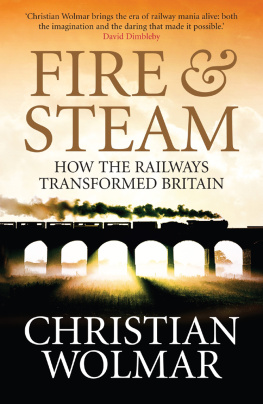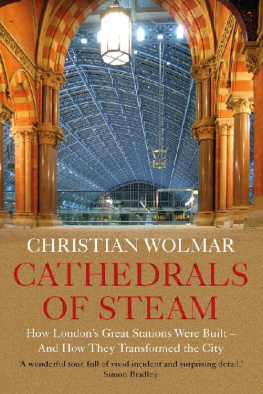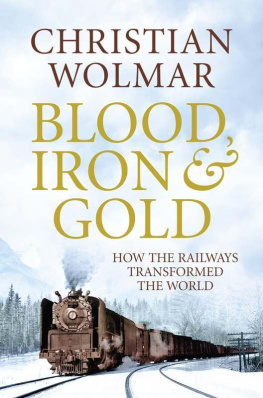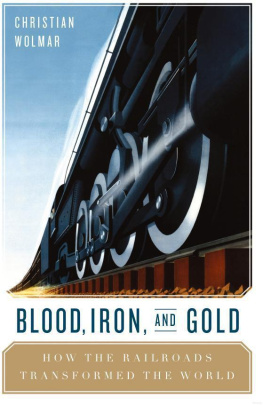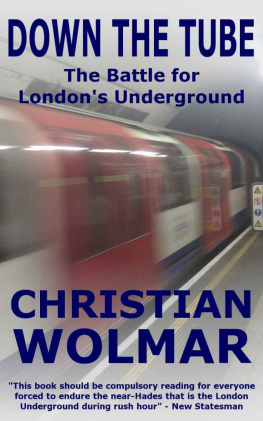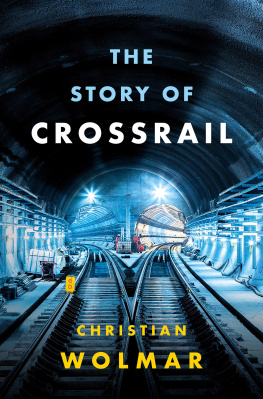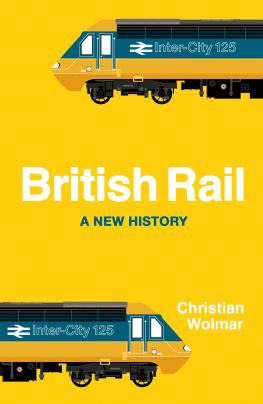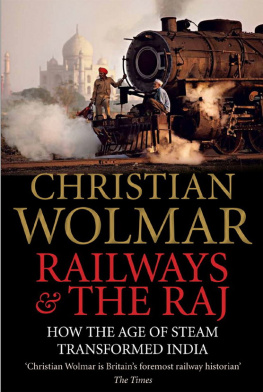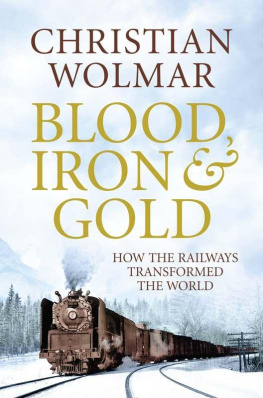On the Wrong Line
HOW IDEOLOGY AND INCOMPETENCE WRECKED BRITAINS RAILWAYS
CHRISTIAN WOLMAR
On The Wrong Line: How Idelogy and Incompetence Destroyed Britains Railways
Christian Wolmar
Copyright 2012 Christian Wolmar
Published by Kemsing Publishing at Smashwords
Smashwords Edition, License Notes
This ebook is licensed for your personal enjoyment only. This ebook may not be re-sold or given away to other people. If you would like to share this book with another person, please purchase an additional copy for each recipient. If youre reading this book and did not purchase it, or it was not purchased for your use only, then please return to Smashwords.com and purchase your own copy. Thank you for respecting the hard work of this author.
ISBN 978-1-908555-01-4
www.christianwolmar.co.uk
The right of Christian Wolmar to be identified as the author of this work has been asserted in accordance with the Copyright, Designs and Patents Act 1988.
All rights reserved. No part of this publication may be copied, stored, transmitted, distributed or otherwise made available in any form or by any means, without the prior permission in writing of the publisher.
First published in Great Britain 2005 by Aurum Press Limited, as a revised and updated edition of Broken Rails by Christian Wolmar, first published by Aurum Press in 2001.
Kemsing Publishing Limited
www.kemsingpublishing.co.uk
enquiries@kemsingpublishing.co.uk
Contents
This book is dedicated to my friend Roger Ford, who knows far more about the railways than I ever will and who keeps me sane through our regular conversations about the madnesses of the privatised railway.
On the Wrong Line was published in 2005 as an updated version of Broken Rails , my original book on the privatisation of Britains railways. We are republishing it here as an eBook, to follow Down The Tube , the story of the Underground PPP, because this story is still very relevant today. Just as with the Underground PPP, the privatisation of the railways was a flawed policy implemented for ideological reasons that cost taxpayers billions of pounds.
Sadly, unlike the ill-fated PPP, the railways remain privatised though, oddly, they are largely under the firm control of the state and the infrastructure is owned by Network Rail which barely anyone outside the Treasury believes is a private company.
Rereading the book seven years later was a salutary experience. Most of the predictions have proved true and while the industrys safety record has recovered from the upheavals of privatisation, reining back the huge extra costs resulting from the structure and from the legacy of the accidents detailed in the book has proved more difficult. But above all, the book shows what a shambles the whole episode was and how politicians on both sides, so in hock to the neo-liberal agenda, could not see that applying it to the railways was fundamentally a bad idea.
The purpose in reissuing these books online is to make them available to future policy makers so that they can learn from the past mistakes. Unfortunately, it seems that the coalition government is, as I write, in the process of destroying the NHS in much the same way that the railways were wrecked by privatisation and trying much the same on education. When will they ever learn?
A short note on how this edition has been edited. By and large, the text is the same as in the 2005 book, though it has been updated where possible and a few short sections added to bring the narrative up to date. There remain, though, some anachronisms where I felt it the text gave an insight to the mood in 2005.
There is one important extra section in this edition. In 2008 when I was working on a TV programme, the researcher asked John Major to appear. He refused but amazingly he wrote a three page statement explaining why the railways were privatised. This was particularly interesting since, in his autobiography, there is absolutely nothing about rail privatisation, even though it was a major issue during his 1992 - 7 government. The full contents have never been published before and therefore they are reproduced here as an appendix as they deserve to go on the record.
Do email me at christian.wolmar@gmail.com with corrections, thoughts and ideas on further updating.
Christian Wolmar
May 2012
* * *

The first half of this book is for the most part an updated version of Broken Rails , which was initially published in late 2001 and then revised and republished in early 2002 in the immediate aftermath of Railtracks demise. The rest of the book, including virtually everything from Chapter 9 onwards, is new, including the conclusion. I have also rewritten Chapter 1, with help and advice from the railway historian Adrian Vaughan. The other material from Broken Rails has been thoroughly revised, edited and updated. Some passages which may sound slightly dated in the light of subsequent events have been retained in their original form; Broken Rails was, in part, an almost contemporaneous account of the privatisation of the railways and I wanted to ensure some of that story remained available as it is an important piece of history. It is just too easy to write everything with the benefit of hindsight. The early days of Railtrack, for example, may not seem relevant now that we find ourselves in a different world in which the railways infrastructure is run by what is effectively a public-sector company, but the fact remains that Railtracks actions in its first few years had a profound and long-term effect on the history of the railway, as well as providing the world with an object lesson in how not to privatise an industry.
The accounts of the accidents remain largely in their original form, apart from a few corrections and some additional material, especially on Hatfield. Of course, it has been necessary to provide a new chapter on the Potters Bar accident, which occurred after the publication of the second edition of Broken Rails . The account of Hatfield in the early editions has proved to be very accurate, and re-reading it for this new book highlighted the awful sequence of events and demonstrated the way in which the accident, which led to the deaths of four men, was so clearly the result of callous political decisions. In fact, the story actually appears more shocking now in the cold light of hindsight than when I wrote about it so soon after the disaster. There really is blood on the hands of those who created the privatisation fiasco and I have left in the detail of the accident as a painful reminder of this terrible calamity. Fortunately, as the book outlines, the whole system of maintenance on the railway has been changed as a result of that disaster.


